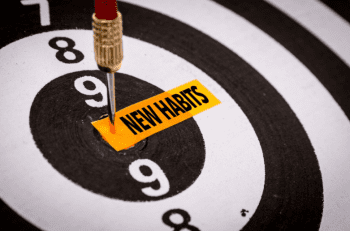Many a time, people tell me that they sit down to meditate but their mind wanders off. Or that they tried to learn a new skill but it was too hard. How come certain people acquire and champion new habits almost effortlessly whereas many others fail terribly? Let me begin with the story of the Chinese Bamboo Tree.
The Chinese Bamboo is rather unusual. Unlike other bamboo trees, it doesn’t grow at all for a long time. At least, nothing appears on the outside. You plant the seed, water it, and nurture it but nothing sprouts. You may even think that the seed has already perished. A whole year goes by and there’s no growth, not even a sign of a sapling.
You continue nurturing it but again nothing shows up in the second year either. Year three, nothing. Year four, nothing. Nothing at all. Year five, nothing. No matter how well you fertilize or care for the seed, there are no results in the first sixty months. Nothing tangible, anyway. Finally, at the end of five years, you see a small sprout. Two tender leaves force their way out of the ground.
How fast could it possibly grow if it took five years just to show its face, one wonders. Well, the bamboo plant actually shoots up as high as eighty feet in merely six weeks. For the first five years when nothing seemed to be happening, it was growing beneath the ground.
I can’t think of a more apt story when it comes to building new habits. Most of us give up too easily, too soon. When you want to build a new habit, expect no results in the beginning. If you are serious about mastering a new skill, just keep inching toward your goal. One step at a time.
Acquiring any skill or habit is akin to the Chinese Bamboo tree. You plant the seed and you keep caring for it, regularly, steadily, carefully. And once a strong foundation is in place, you will soar high in practically no time. A few months ago, I wrote Why do Your Plans Fail? (Here). Let me share with you the three golden rules of building any new habit.
1. Practice
Take it as a given that it’s going to be hard in the beginning, even boring. Learning anything new is bound to have a set of challenges. To reach a state where it becomes effortless, you have to put in a great deal of practice. It takes a concert pianist an average of 10,000 hours of practice before they reach that ‘expert’ level. Practice. Practice. Practice. When you are bored, practice a bit. When you think you are tired of practicing, refresh your practice. When you feel you can’t go on, practice a bit more anyway. Gradually increase the intensity, quality, and duration of your practice.
2. Patience
If you don’t give up, you can’t fail. For example, if you are learning to meditate, don’t expect that you will start diving into the ocean of tranquility within the first few hundred hours. Don’t expect that just because you are determined to meditate, your mind will go quiet. It took me several thousand hours of intense, mindful, and correct practice before I began experiencing different states of consciousness. Patience is the key. It becomes much easier to be patient if you don’t have unreasonable expectations from yourself.
3. Focus
I once read a beautiful quote by Max Lucado: “The one who wants to lead the orchestra must turn his back on the crowd.” As you progress with focus, you learn to know which or whose feedback you need to act on versus what to reject. By focus, I mean a sort of mindfulness. If you are practicing patiently, chances are you are focusing anyway. If you want long-lasting results from your practice, however, you have to be mindful.
Going back to the example of meditation, while meditating, pay attention to every passing moment, every emerging thought, every inhalation, and exhalation. This razor-sharp alertness will take your practice to an entirely new level. It’s the art of turning inward and listening to your own voice.
Mulla Nasrudin bought his wife a new piano for her birthday. The neighbors would hear her practice every day, several hours a day. A couple of weeks later, the sound of the piano stopped coming from their home.
“What happened, Mulla?” they asked him. “Your wife doesn’t practice piano anymore?”
“For heaven’s sake,” Mulla exclaimed, “don’t even mention the piano. I had her switch to flute with great difficulty.”
“But, why?”
“Because with a flute,” he replied, “at least, she can’t sing while playing…”
Don’t switch (and don’t sing either if you are just starting out). Humor aside, if you really want to master any new habit then keep practicing quietly.
To build a new habit or to champion a new skill, somewhere, you have to want it desperately. More desperately than gaining other people’s approval. Those who don’t have the same vision as you will disagree with you (sometimes with all the right intentions). There will be those who won’t believe in you, but if you are serious then all you have to do is to continue practicing patiently and mindfully.
In anything that you undertake, if you don’t give up, you’ll move from a phase of intense effort to absolute effortlessness.
The higher you want to rise, the deeper your roots need to be. It’s the depth that takes time. If you are not afraid of going deep, you will have no fear of heights either.
Peace.
Swami
Editorial Note
I fear not the man who has practiced 10,000 kicks, but I do fear the man who has practiced one kick 10,000 times – Bruce Lee
This single quote captures the essence of habit. When one does something over and over, it becomes a part of the body and mind’s wiring. This is why we brush our teeth every day – a voluntary habit. This is why we breathe every day – an involuntary habit.
Arguably the greatest martial artist in history, Bruce Lee is one of the best contenders for the power of habit. From the moment he was initiated, Lee lived and breathed the martial arts. His every day was spent in training, practice and action.
What if Lee had stopped learning mid-way? Or what if he had decided that martial arts weren’t for him because they were too challenging? What if his moments of frustration had gotten the better of him?
The world would have been short of one of its most inspiring success stories.
As the famous Lao Tzu saying goes –
Watch your thoughts;
they become words.
Watch your words;
they become actions.
Watch your actions;
they become habits.
Watch your habits;
they become character.
Watch your character;
it becomes your destiny.
How long does it take to form a habit? It matters not. It matters only that you are persistent because the power of habit – it can script your destiny.
Course
Art of Meditation
Free yourself from suffering and live life to the fullest. Learn the yogic technique of meditation in 4 days (and master it over a lifetime)
The FAQs below give you more insight into the most powerful habit of all – habit itself.
Habit is a habit.
How long does it take to change one’s habits and be successful in life?

Just as the answer varies to the question, “How long does it take to form a habit?”, there is no absolute answer to how long it will take you. It depends on multiple factors, and your pace is only one of them. More often than not, it is just about staying the course and persisting and staying motivated. We all know the hare and the tortoise classic.
There are essentially four elements that lead to success:
- Knowledge
- Approach
- Resources
- Efforts
Continue reading about them and a mysterious fifth element in How Long Before I Succeed?
How do I build a habit?

The singular important common denominator in the lives of all successful people is this: they almost always open their day with a productive morning. They have a routine that they stick to no matter what.
Most people we call gifted are usually the product of relentless discipline, dedication and hard work. Whatever you wish to master, give it a bit of time every day and before you know it, you’ll be frolicking about in the same pond of creativity and competence as the best of the best in your field.
Per psychology, moving from incompetence to competence has four stages. It is a skill anyone can acquire:
- Unconscious Incompetence (The Novice) – We don’t know that we don’t know.
- Conscious Incompetence (The Apprentice) – We know that we don’t know.
- Conscious Competence (The Journeyman) – We know that we know.
- Unconscious Competence (The Master) – We don’t know that we know.
Continue reading about the four stages of competence in Eat That Frog.
What are some habits that can help one stay mentally strong?

Many people are stuck alone with their thoughts, and sometimes those thoughts can be damaging. It can feel like an endless cycle with no light at the end of the tunnel.
In this article, 46 mental health experts give us unusual tips about staying mentally stable during lockdowns. They give insightful advice that can work as a compass for those struggling with their mental health during these trying times. Whether you are dealing with anxiety, depression, or grief, these expert habits will help you stay mentally stable during the lockdown and the pandemic.
- Participate in volunteer programs
- Stay physically active
- Keep a schedule or daily routine
- Take a break from technology
- Invest in self-care
- Ask for help
And 40 other habits that you can read about. How long to build a habit that will be sustainable? The answer is simple – it depends on you and your determination.
The 3 Golden Principles of Sticking to Habits
Many of us make new year’s resolutions with much gusto, only to see them fizzle out within the first week itself. And the interesting thing is, I don’t think it’s because we lack willpower. Most of us have plenty of it.
Rather than making resolutions per se, I’d like to offer you a different approach that makes the best use of two of your most valuable assets: mindfulness and motivation. If you are motivated and you are mindful of sticking to your discipline, half the job is done.
Whether it’s a new habit you wish to form or an old one you want to drop, if you want to keep your new year resolutions or be more productive with your time, here are three key points to remember:
- Enthusiasm over optimism: Enthusiasm keeps you focused on the action, it helps you remain motivated and curious. Optimism pays but being insanely optimistic is a recipe for disaster.
- Important things first: Build your day around the things that matter to you. This is just about the only way to ensure that you will get them done.
- One day at a time: What may seem like a little effort today will matter when you do a bit more tomorrow. It stacks up real fast.
Read more about these three key points and the fourth, most important, point in Making New Year Resolutions Work.
How long does it take to form a habit?
Every action and reaction of ours is simply a habit. The easiest way to create a new habit is by replacing an existing one. The video below highlights the way to form a new habit and how long one must do it before it becomes permanent.

Timeline:
- 0:12: The one skill that will give us tremendous peace
- 1:38: The African tribe’s Happy Song
- 4:36: How long does it take to build a new habit?
- 5:16: When a person gets angry
A GOOD STORY
There were four members in a household. Everybody, Somebody, Anybody and Nobody. A bill was overdue. Everybody thought Somebody would do it. Anybody could have done it but Nobody did it.
Don't leave empty-handed, consider contributing.It's a good thing to do today.









Comments & Discussion
20 COMMENTS
Please login to read members' comments and participate in the discussion.